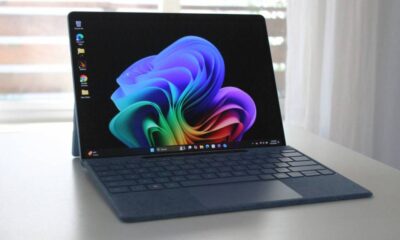Tech News
Microsoft shares details of plans to reduce water usage of AI datacentres

Microsoft Unveils Waterless Cooling Design for AI Datacentres
Microsoft has revealed a groundbreaking blueprint for designing datacentres hosting artificial intelligence (AI) workloads without the need for water cooling. The company claims this design could eliminate the consumption of over 125 million litres of water traditionally used for cooling purposes.
The innovative design features a closed-loop system that utilizes recycled water during construction and continuously circulates it to cool the servers and chillers within the facility. This method eliminates the need for fresh water, promoting sustainability and environmental conservation.
While Microsoft’s current datacentres still use water for cooling alongside air-cooled systems, the company plans to pilot the new waterless design at two US sites in 2026, with a goal of implementing it across all its facilities in the future.
By August 2024, Microsoft began incorporating the next-generation cooling technology in all new datacentre designs, aiming to make zero-water evaporation the primary cooling method. The new sites are expected to be operational by late 2027.
Microsoft emphasizes its commitment to water efficiency, reporting significant improvements in water usage at its datacentres. The company measures water efficiency using the Water Usage Effectiveness (WUE) metric, achieving a 39% improvement in the last fiscal year.
In response to growing concerns about water scarcity and environmental impact, Microsoft pledged to replenish more water than its operations consume by 2030. The company’s efforts to reduce its environmental footprint extend to other initiatives, such as building wooden server farms and incorporating sustainable materials like microalgae-based limestone in construction.
While Microsoft previously experimented with underwater server farms, the company has since decided not to pursue this technology further.
-

 Destination6 months ago
Destination6 months agoSingapore Airlines CEO set to join board of Air India, BA News, BA
-

 Breaking News8 months ago
Breaking News8 months agoCroatia to reintroduce compulsory military draft as regional tensions soar
-

 Tech News10 months ago
Tech News10 months agoBangladeshi police agents accused of selling citizens’ personal information on Telegram
-

 Breaking News8 months ago
Breaking News8 months agoBangladesh crisis: Refaat Ahmed sworn in as Bangladesh’s new chief justice
-

 Gaming7 months ago
Gaming7 months agoThe Criterion Collection announces November 2024 releases, Seven Samurai 4K and more
-

 Toys10 months ago
Toys10 months ago15 of the Best Trike & Tricycles Mums Recommend
-

 Toys8 months ago
Toys8 months ago15 Best Magnetic Tile Race Tracks for Kids!
-

 Guides & Tips8 months ago
Guides & Tips8 months agoHave Unlimited Korean Food at MANY Unlimited Topokki!
























